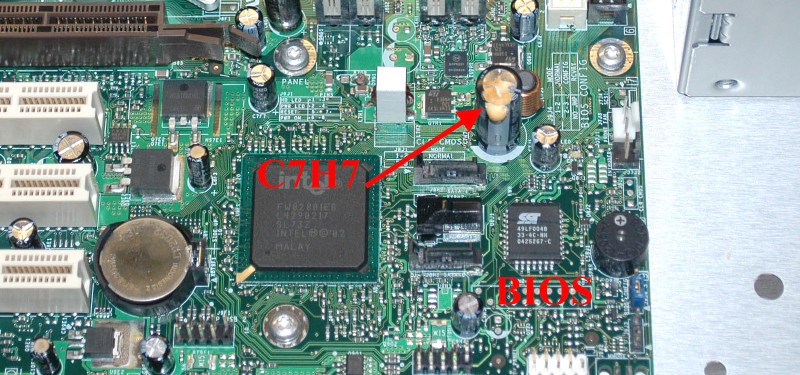[Matthew D’Asaro] was recently entrusted with an entire classroom fleet of fourteen broken Tektronix TLA5202 logic analyzers — a pile of equipment that once was worth hundreds of thousands of dollars. His task: Fixing them. He fixed them all, and on the way documented a number of common failure points in these old but still great devices.
[Matthew] found that Tektronix’s portion of the electronics took the ravages of time and classroom use quite well, only the embedded desktop PCs inside the machines simply weren’t built for the ten-year. Some of the hard-drives had to be replaced, but most units wouldn’t even make it to the power-on self-test (POST). A closer inspection of the generic Intel microATX motherboards quickly revealed that some of the e-caps already bit the dust, leaving behind a spill of leaked electrolyte and a blown SMD fuse. Replacing both restored functionality on these boards.
The sweet victory of repairing a piece of top-notch equipment is not always so close. In one of the analyzers, the mainboard couldn’t be fixed, it had to be replaced. [Matthew] was able to source an identical board, to which he transplanted the logic analyzer’s customized BIOS IC. Another analyzer was plagued with a dim power indicator LED, caused by a cracked trace in the flexible silver-ink PCB it was mounted to. A drop of silver epoxy and a bit of superglue solved the problem.
Based on fourteen units, [Matthew’s] writeup covers a big chunk of what can go wrong inside electronic devices after a decade of service, and what to check first when a quick fix is in need. What do our readers look at when a device shows signs of fatigue? Let us know in the comments!



















One word, “WOW!”.
Tektronix= way overpriced, cheap labor, poor design, easily breakable crap. This coming from someone who has worked with their crap for over 30 years. Nuff said. When we buy equipment for our lab, and I’m talking hundreds of thousands of dollars, we never look at Tektronix. If I want that kind of product, I will shop at Walmart. Im surprised they even exist.
So for your “home” lab, what vendor do you recommend?
Not a “home” lab we purchase equipment for. But for your “home” lab, they may be fine.
When one buys tools, they can go with popular mechanic brand every few years or go pro and not worry yearly (or daily) on replacement. Your call……
I think James was looking for a recommendation.
I’ve had my own lab for ~30yrs and started with HP; 1742A cro, multimeter, probe tools, 6264B power supply, then went to a pair of 1631A/D combo cro/analysers (ie multi time base testing), few HPiB interface with National Instruments, 7586B A0 plotter (repaired the serial io from a power surge) then a 6813A/B (started as A became B) then HP frequency counter, all still works though the cros are overdue for cal… Though have HP1000 tape drive unit in need of refurbishment as it used to run – could prob do with an ESP8266 front end ;-)
Friend has heaps of yokogawa and swears by them ahead of HP but, data less available for any surge repairs…
Although it seemed highly priced at the time I had very little trouble, the front panels are still very robust despite techs with thick fat fingers used to removing gearboxes. Data & some custom ICS on DIY repairs hard to get though few ph calls to head office in USA from Australia fixed that pronto with only slight freight delays – most of that changed later on as less reliance on custom IC’s & cross ref HP parts of industry standard at first with more ph calls then published :-)
I’ve had tex cros in the lab though mostly for minor repair to HV circuits, once tech brought his own in for use as more familiar, still have a textronix 4054 though – lol & still works !
It all depends, once you commit to equipment make sure you have a good management plan to deal with spares, pre-emptive if possible,
except for the occasional hiccup, Dave Jones seems to be quite happy with Tektronix..
Don’t think i’ve heard any negative comments from him on build quality.
Let’s guess – You’re a “disgruntled” FIRED (for good cause) EX-Tektronix employee with a 30+ yr grudge. FYI Tektronix O’scopes are legendary. Sure some of the later designs made compromises to compete in a price sensitive market, however their high end equipment was representative of ‘you-get-what-you-pay-for’ (more $$ = more quality and features).
There seem to be quite a number of people within the electronics world that complain about quality.
Yet, Completely disregarding what it was they paid to get what they wanted, Much like AvE. He’s an asswipe with lousy roll-off-toung jokes that don’t even make sense.
HURR DURR LOOK AT ME, I’M SO SMART BECAUSE I’M RUNNING AN ARDUINO SAMPLE SKETCH.
There seem to be quite a number of people who think dissing others makes themselves look smarter. I enjoy the AvE channel but it’s unfair to expect someone to be an expert in every field. It’s unlikely his day job is programming arduinos. To me it just seems he wants to show people unfamiliar with arduino’s that it’s not very hard. Comments like this reflect more on yourself.
I do not intend to make my self look smarter. I just wish to state my peace and go about the rest of my day.
Yes, It’s impossible for somebody to be an expert within every imaginable field.
Point being, There is so much more to the micro controller world than a measly Atmega8 based device.
in my opinion, there exist far more entertaining and educational channels on behalf of learning electronics
ie, eevblog, afrotechmods, devttys0, Jerry Ellsworth.
I just don’t like videos of people screwing around all the time. *cough* Rhiona Super Genius *cough*
The reason I wasn’t to happy with him was because of his video hating a pair of calipers.
That he paid what, A little over 10$ for? come on.
[Dmitry] Please leave the all-caps at YouTube.
Terry: Might have replied too late (sorry for necrobumping the thread. Came across it from google), but I’ll back you up on that. I really despise the comment from “AR15-4ever” suggesting that you might be a disgruntled Tek employee. That comment sounded like company-sponsored trolling.
If you work with repairing TDS 300~800 series oscilloscopes, you’ll know how badly it was designed (for longevity and serviceability). Electrolytic caps in TDS 300~800 series are bound to leak, and the irreplaceable flyback transformer fails frequently. I never had capacitors leaking in such a massive scale (proc, acq, keypad, CRT driver, power supply, RS-232 board) with HP/Agilent products, other than the first generation Infiniiums that they unwisely trusted FIC (VA-503) for the generic ‘industrial’ PC motherboard that has bad capacitors. Not to mention that how much of a pain it is to adjust the Tek CRT driver that you’ll need to take the whole tube+driver out of the case (and hang the tube with short spaghetti of cables) and build two extension cables for it.
Tek doesn’t even get the autoscale algorithm right even for the high end TDS6000B/C series (still goes for $10k+ in 2019): it will show a large time/div that aliases your signals when it get to multiple Ghz (even if it’s a clean one-tone sine wave!) and it doesn’t auto-detect channels with an active signal on it. Never have to live with this kind of BS with Agilent gears (the comparable ones are Infiniiums).
Don’t get me started on Tek’s dials (rotary encoder) that responds with half a second delay (The later ones like TDS 200 or 1000 series with an LCD screen still does that) and you’ll need to scroll to the second page of the menu to get Vpp (even deeper for frequency) measurements. Agilent’s interface makes sure you can get the most common measurements with the least number of maneuvers.
I hope Tek has improved in the recent years (haven’t got my hands on their latest and greatest), but Tek certainly made some really unpleasant products in the past. Given my experience with the old instruments, I will not even look at Tek’s new products unless I’m on a tight budget and magically Tek charges 40% less than Agilent/Keysight, which is unlikely.
To be fair, Tek gears does what they claim (specs and features), and I heard many people swear by it (while it lasts, which it doesn’t nowadays for their aging equipment), but Tek comes really short at being considerate towards day-to-day end-users, in terms of interface design, long-term reliability and out-of-warranty support.
Tek think in much shorter terms (their gears aren’t supposed to live beyond their active support period) compared to HP/Agilent/Keysight. Agilent is way more generous helping people with servicing their discontinued products, which I think it’s a great way to more get people into their eco-system, yet Tek actively discourages people from fixing their old gears.
I am not an electronics professional but as a PC enthusiast I know a crap PC motherboard. I had a bad experience with a Techtronix 613 Logic Analyser and its sub par 810 industrial motherboard. A lot of old Intel industrial, desktop motherboards are poor quality. Though with the Tecktronix 5200 series of logic analysers use a regular Micro ATX motherboard with PCI slots which gives some options if the motherboard dies.
All electronics break. I served my apprenticeship in an age when there were only two serious choices for test equipment; Tektronix or HP. But the world has changed. ( I know that from having repairing hundreds of scopes.) Best scope EVER made was the Tek 2465B. For a basic bench scope nowdays I’d probably buy a Rigol to get the most bang per buck.
Re:notarealemale
So you derail from the original argument at hand just to state an irrelevant point?
You probably have the attention span of a goldfish.
True.
Electrolytic caps are the devil. They tend to come from certain batches it would seem – some things, 80 years old still work great, yet a camcorder or motherboard from the early 90’s might have “the plague”, along with how they are treated inside equipment – like:
heat, is there a fan?, does that fan work? does it move enough air?
I troubleshoot A LOT using my nose and my eyes. Caps and resistors get hot and bake themselves, caps short, there goes a hole in the board from the resulting flames and a blown fuse… Did the cap have the plague, or was it just too damn hot in there? fan stuck? if it gets hot, it probably smells.
Chips and things tend to go as a result of some passive component failure, so you always have to know WHY it failed BEFORE you fix it, because you will spend a day reworking some 100 pin device and then flip the power on and BLAMO! The chip you just wasted all your effort on is dying due to a shorted diode…
I tend to like LeCroy scopes at work because I know my way around them better than the tek’s. But I do have a used ’90s tek at home and I’d take it over a new rigol any day of the week. Built like a tank and better features for the price. I need a real scope with 500Mhz @ 2Gs more than I need a cheap Chinese POS AND I saved money.
Original HP gear tends to last forever, a lot of old stuff at work outperforms the newer Keysight garbage.
But there is no equipment shortage here, if something breaks, toss it and grab another, so….